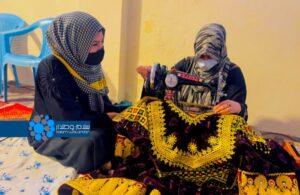KABUL (SW) – Salam Watandar’s findings from interviews with 36 midwives from different provinces of Afghanistan show that women in different sectors even lose their lives due to the lack of female health personnel to access health services, but in a clear paradox the midwives are facing a shortage of work.
These midwives say that even if they are employed by different aid institutions, they do not have enough facilities to treat patients.
Among the 36 midwives who were interviewed in this report, 18 of them are unemployed and 18 others who are concerned about the lack of work facilities and the overcrowding of clients. Midwives who have been unemployed for years despite their efforts to work, blame health institutions of not having meritocracy and not expanding their work capacity.
Basira and Hasna are two midwives who tried hard to find a job but failed to get it. According to these two midwives, there is a great need for female health personnel in Afghanistan, but due to the non-expansion of health institutions, most midwives remain unemployed. They say that now only midwives who have knowledge and mediation in health institutions can be accepted in the workforce.
Basirah says about this: “I have always been looking for work, but I have not been able to find a job. Whenever I have tried something, I have faced many problems because of third-party mediation and nepotism, I have not even been shortlisted.”
Hasna also says about this: “I was looking for work a lot, but because there was no intermediary and knowledge, I did not get a job. When we took action, we faced a lot of challenges.”
On the other hand, restrictions imposed on women by the caretaker government in the health sector have also affected midwives. The ban on the exit exam for girls who have graduated from midwifery and the restrictions on women’s work and movement are other factors that have caused the unemployment of some midwives.
Fatima, a lady who graduated from midwifery one year ago, but she was not allowed to participate in the midwifery exit exam by the government, says: “All the girls and women who have graduated have not been able to participate in the public health exam and the Islamic Emirate has not allowed us to pass the exam and I was looking for work, but because I don’t have documents and haven’t passed the public health exam, no place will accept me.”
Shakra, another midwife who lives in Kunduz, says that due to restrictions on women’s work, she is unemployed and all her dreams of having a job and financial independence have been dashed. “I have finished the course and when I have visited my respective clinics and hospitals several times, I have been rejected.” she adds.
However, a number of women who are currently working in various hospitals and clinics also complain about work congestion and the lack of work and health facilities.
Sadaf, who is a midwife at Naib Aminullah Khan Logari provincial hospital in Logar, says about her work challenges: “One of the problems of midwives is their workload and the organization is very small. There is also a problem with the Ministry of Public Health and the organizations that formed BPHS. We ask them to build more organizations and facilities to prevent the deaths of mothers and babies.”
Financial problems and not having enough livelihood are other challenges that midwives are dealing with.
Fereshta Heydari, one of the midwives, says: “During the Republic, my income was higher, it was enough. Now our salary in this hospital is low, we are told that if you work for this salary, do it, if you don’t, we will hire another midwife instead of you.”
Hamira Hamraz, another one of the midwives, also says: “I worked for four years without a salary, all expenses were borne by us, we were not paid by the hospital.”
The midwives say that the organization in the hospitals is small and the health centers are also small in terms of the needs of the people, and for this reason, the congestion on the health personnel of the hospitals has also increased and many midwives have also remained unemployed.
Maleka, one of the midwives, says: “There is not even a clinic, they bring the patient to the hospital from the surrounding area. More clinics should be established around. My request to the government is to build clinics and health centers.”
Fariha, another midwife, also says: “The problems of midwives is that, for example, there are few health centers in our province. “The main challenges of midwives are that they are unemployed and their main problems are the lack of health centers.”
Meanwhile, Parveen, a professor at one of the universities of medical sciences, and Khaleda, a professor at one of the private institutes, believe that the need for midwives in the country is far more than the current staff of midwives in hospitals, and they say that the government should build more hospitals and clinics to reduce the mortality of mothers and babies so that midwives can work.”
They say that in different provinces, women lose their lives during childbirth and pregnancy. They want the government to expand the field of work for midwives in order to prevent the deaths of mothers and babies. Khaleda adds: “According to the statistics of the Ministry of Public Health, we need one midwife for every eight women. Yes, we still need midwives.”
Vajmeh Yaqoubi, a women’s rights activist, says that the need for midwives is greater in the provinces than in Kabul. She adds that every year many mothers and babies lose their lives.
According to her, despite the need for midwives across the country, the unemployment of a large part of midwives shows the lack of proper management in the health sector in the country. She says: “Unfortunately, there are problems in most provinces that suffer from the lack of midwives and gynecological specialists. That’s why there are no midwives. Until the mother or the child is transferred to health centers, or the child dies, or the mother and midwives are discharged, but they don’t have a job, the reason for their unemployment is that they don’t allow work without Muharram in the current situation.”
However, Sharaf Zaman Amarkhil, the spokesperson of the Ministry of Public Health, says the number of unemployed midwives is 26 thousand and emphasized that the ministry is trying to expand the field of work for midwives. He adds: “In general, we do not have accurate statistics about the number of midwives, but roughly, we can say that there are about 4,000 midwives in government medical centers and about 6,000 midwives in the private sector. Of course, more than 26,000 midwives have graduated from educational institutions all over the country, and we are trying to provide them with a job.”
Accordingly, the Islamic Emirate of Afghanistan has added about 11,000 people in the structure of the Ministry of Public Health in the last two years to create a working environment for midwives, nurses and female doctors.
It should be noted that Afghanistan is one of the countries where a woman dies every two hours during childbirth or during pregnancy.
ENDS






